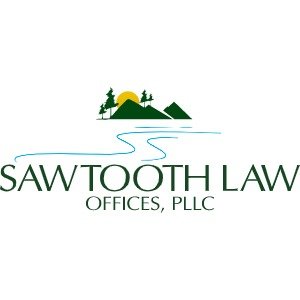Best Bankruptcy & Debt Lawyers in Idaho
Share your needs with us, get contacted by law firms.
Free. Takes 2 min.
Or refine your search by selecting a city:
List of the best lawyers in Idaho, United States
United States Bankruptcy & Debt Legal Articles
Browse our 2 legal articles about Bankruptcy & Debt in United States written by expert lawyers.
- Filing Chapter 7 in 2026 United States: New Income Limits
- Chapter 7 gives a near-total discharge of most unsecured debt, but you must pass a "means test" that compares your household income to your state's median income for your family size in 2026. The U.S. Trustee Program updates the state median income numbers at least once a year; you qualify... Read more →
- Debt Collectors in the US: Stop Harassment and Verify Debt
- You have strong federal rights under the Fair Debt Collection Practices Act (FDCPA) and CFPB Regulation F. Collectors cannot harass you, must send a validation notice, and must stop collecting until they verify if you dispute in writing within 30 days. Tell collectors to stop contacting you, then follow up... Read more →
About Bankruptcy & Debt Law in Idaho, United States
Bankruptcy and debt law in Idaho helps individuals and businesses handle overwhelming financial obligations. These laws provide structured ways to manage or discharge debts, protect some assets from creditors, and get a fresh financial start. Bankruptcy falls under federal law, but local Idaho rules and procedures also play a role in the process. Common types of bankruptcy for individuals include Chapter 7 and Chapter 13. Businesses may consider Chapter 7 or Chapter 11. Idaho's exemptions and legal processes can significantly affect your case, making local knowledge crucial.
Why You May Need a Lawyer
Facing serious debt can be stressful and confusing. You may need a lawyer in the following situations:
- If you are considering filing for bankruptcy and are unsure which chapter is best for you
- When creditors are harassing you with collection calls or lawsuits
- If your wages are being garnished or you risk losing your home, vehicle, or essential property
- If you want to negotiate a debt settlement or restructuring outside of bankruptcy
- When you need guidance understanding how bankruptcy will impact your credit, assets, and future
- If you operate a business with mounting debts
- When you have complicating factors like recent property transfers or non-dischargeable debts
- If you receive communication from trustees, creditors, or the court that you do not understand
- When you are concerned about protecting co-signers or jointly owned property
A knowledgeable lawyer can explain your options, file paperwork correctly, and represent your interests throughout the process.
Local Laws Overview
Bankruptcy filings in Idaho are processed through the United States Bankruptcy Court for the District of Idaho. While bankruptcy is federal law, Idaho laws impact the process through state-specific exemptions. Idaho residents must use Idaho exemption laws rather than federal ones, with very limited exceptions. Exemptions protect certain equity in your home, car, personal property, retirement accounts, and more from creditors. Properly claiming exemptions is critical to keeping your property during bankruptcy.
Idaho also has rules about waiting periods between bankruptcy filings, required credit counseling, attorney representation, and local filing procedures. If you own real estate or business assets, local laws and court rules may affect how these are treated in bankruptcy.
It is important to understand both federal bankruptcy rules and Idaho-specific regulations when evaluating your debt relief options.
Frequently Asked Questions
What types of bankruptcy are available in Idaho?
The most common types are Chapter 7 (liquidation) and Chapter 13 (repayment plan) for individuals. Businesses may also use Chapter 11 reorganization. The right chapter depends on your income, assets, and goals.
Will I lose my home or car if I file for bankruptcy in Idaho?
You may be able to keep your home and car if they are within Idaho's exemption limits and you keep up with payments. Your lawyer can review your specific situation.
How long does bankruptcy stay on my credit report?
A Chapter 7 bankruptcy remains for up to 10 years, while a Chapter 13 bankruptcy stays for up to 7 years after the date of filing.
Are all debts eliminated in bankruptcy?
No. Some debts such as most student loans, child support, alimony, and recent taxes usually cannot be discharged. Your lawyer can review which debts are eligible.
Can creditors continue to contact me after I file for bankruptcy?
No. Once you file, an automatic stay prohibits most collection actions, including calls, lawsuits, and wage garnishment.
How much does it cost to file for bankruptcy in Idaho?
Filing fees generally range from $335 to $410, depending on the chapter, plus attorney fees if you hire one. Some filers may qualify for fee waivers or payment plans.
Do I have to go to court if I file for bankruptcy?
Most cases require you to attend a meeting of creditors, but you may not need to appear before a judge unless there are disputes or challenges.
How do Idaho bankruptcy exemptions work?
Idaho law lists specific dollar amounts of property you can protect, including equity in your home, vehicle, tools of trade, and retirement accounts. It is important to properly claim these exemptions.
Do both spouses have to file for bankruptcy together?
No, both spouses are not required to file, but it may make sense if most debts are joint. Discuss the pros and cons with a lawyer.
Can I file for bankruptcy more than once in Idaho?
Yes, but there are required waiting periods between filings that depend on the type of your prior bankruptcy case and the new one.
Additional Resources
If you need more information or assistance, the following resources can help:
- United States Bankruptcy Court for the District of Idaho - For court forms, rules, and local procedures
- Idaho Legal Aid Services - Free or low-cost legal help for eligible individuals
- Idaho State Bar Lawyer Referral Service - Connects you to qualified local attorneys
- Federal Trade Commission (FTC) - Educational resources on debt and credit
- Idaho Department of Finance - Information on debt collectors and consumer protections
- Consumer Financial Protection Bureau (CFPB) - Guidance on credit counseling and debt relief options
Next Steps
If you are struggling with debt and considering bankruptcy in Idaho, begin by gathering detailed information about your financial situation. This includes your assets, income, expenses, debts, and any court or collection activity against you.
Before taking action, it is wise to consult with a qualified Idaho bankruptcy attorney. They can help you understand whether bankruptcy is right for you, which type to file, and how to protect your assets. An attorney will guide you through counseling requirements, paperwork, court procedures, and communications with creditors.
You can contact local resources such as the Idaho State Bar's referral service, legal aid organizations, or reputable private attorneys. Be wary of debt relief scams or non-attorney petition preparers who may not act in your best interest.
Taking early, informed steps can give you the best chance at a financial fresh start and peace of mind.
Lawzana helps you find the best lawyers and law firms in Idaho through a curated and pre-screened list of qualified legal professionals. Our platform offers rankings and detailed profiles of attorneys and law firms, allowing you to compare based on practice areas, including Bankruptcy & Debt, experience, and client feedback.
Each profile includes a description of the firm's areas of practice, client reviews, team members and partners, year of establishment, spoken languages, office locations, contact information, social media presence, and any published articles or resources. Most firms on our platform speak English and are experienced in both local and international legal matters.
Get a quote from top-rated law firms in Idaho, United States — quickly, securely, and without unnecessary hassle.
Disclaimer:
The information provided on this page is for general informational purposes only and does not constitute legal advice. While we strive to ensure the accuracy and relevance of the content, legal information may change over time, and interpretations of the law can vary. You should always consult with a qualified legal professional for advice specific to your situation.
We disclaim all liability for actions taken or not taken based on the content of this page. If you believe any information is incorrect or outdated, please contact us, and we will review and update it where appropriate.
Browse bankruptcy & debt law firms by service in Idaho, United States
Idaho, United States Attorneys in related practice areas.
Browse bankruptcy & debt law firms by city in Idaho
Refine your search by selecting a city.











